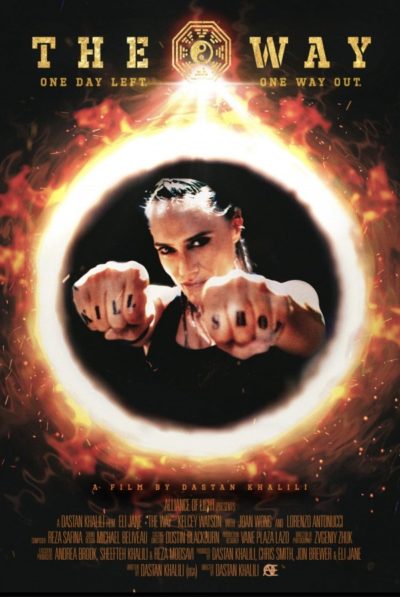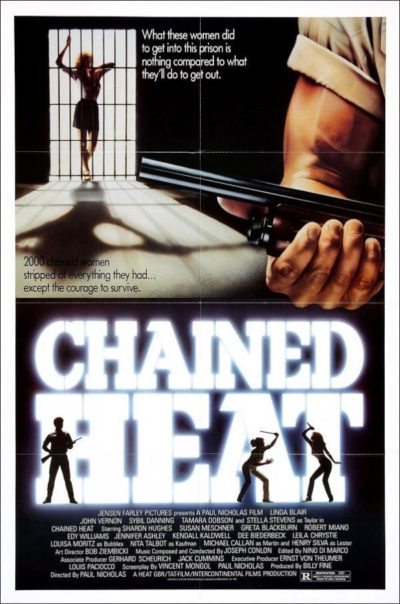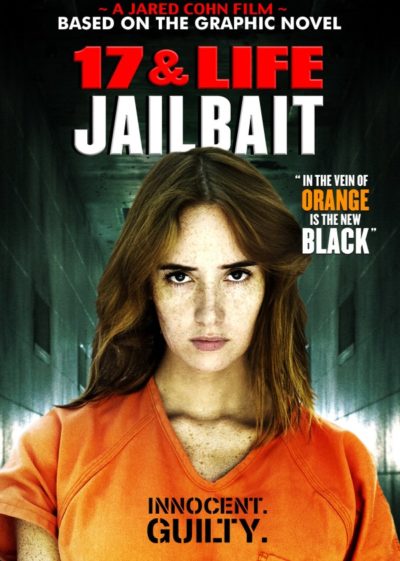★★★½
“Light pink(y)”
 Made by Toei, this is very much a straightforward “pinky violence” film in concept, telling the story of the Wildcats and, in particular, their leader Maki Hyuga. What separates this – in ways both good and bad – from the pack is that Maki is played by Sue Shiomi, best known for her roles in the Sister Streetfighter series of films. That means the action in this is considerably improved on the typical pinky violence movie, with Shiomi capable of holding her own, even when fighting many opponents. In particular, her skills with a pair of nunchaku is a sight to behold. The scenario here provides plenty of opportunities for her to show all her abilities off.
Made by Toei, this is very much a straightforward “pinky violence” film in concept, telling the story of the Wildcats and, in particular, their leader Maki Hyuga. What separates this – in ways both good and bad – from the pack is that Maki is played by Sue Shiomi, best known for her roles in the Sister Streetfighter series of films. That means the action in this is considerably improved on the typical pinky violence movie, with Shiomi capable of holding her own, even when fighting many opponents. In particular, her skills with a pair of nunchaku is a sight to behold. The scenario here provides plenty of opportunities for her to show all her abilities off.
However, the downside is that Shiomi is simply too “good” to play a bad girl. When you put her beside the titans of the genre, like Meiko Kaji or Reiko Ike, Shiomi just does not have the necessary edge to succeed as the leader of an all-female gang of delinquents. Any group led by Shiomi would, I feel, be more likely to sell you cookies or help old ladies across the road, than beat you up and take your lunch money. It’s notable that, while this is certainly not short on the nudity required in the field, Shiomi remains firmly attached to her clothes. Others take care of this onerous duty, with the heroine instead providing the second half of the sex ‘n’ violence recipe.
The story sees Maki running foul of Yakuza chief Ryunosuke Daimon (Nawa) after rescuing a girl from his white slavery operation, and also annoying rich bitch Takako Ebihara (Ohara). Their revenge ends in Maki being framed and sent to prison, while the rest of her gang get hooked on smack by Daimon, and turned into compliant slaves. However, she gets help from an unexpected quarter, in the form of Daimon’s top bodyguard Tetsuya Eto (Nanjô), an honourable ex-boxer who grows increasingly unhappy with his boss’s sleazy business practices. Takako is also unimpressed when she discovers she’s going to be married off to Daimon, whether she wants to be or not. That comes after he has blown up Takako’s father with a car-bomb.
Things unfold as you’d expect. Maki wins the respect of her cell-mates, breaks out and, with Tetsuya are her back, storms the headquarters of Daimon’s yakuza clan, just as he is in the process of getting married to Takako. She’s not there to bring the gang boss a toaster or some nice crockery. If almost entirely predictable, the presence of Shiomi, and resulting upgrade in the quality of the fight sequences does make it feel relatively fresh in style – just not in content. The main factor which stops it reaching the top tier for the genre is the sense Shiomi is almost cos-playing as a bad girl, something you never doubted with the Queens of Pinky Violence. There’s good reason she only dabbled in this field.
Dir: Makoto Naitô
Star:Etsuko Shihomi, Misa Ohara, Tatsuya Nanjô, Hiroshi Nawa





 This feels almost like a throwback to the silent era, and ‘white slave’ films with titles like Traffic in Souls, combined with a significant fear of ‘the other’. As such, it’s both painfully simplistic, and endlessly fascinating in the layers of interpretation which can be read into it, should you be so inclined. On the most basic level, it’s your everyday tale of “good” girls, kidnapped for sale to the highest bidder, who need to fight to retain their modesty and virtue. [Though let the record show, at no point is there any bikini-wearing wielding of automatic weapons, despite what the poster clearly wants you to think. The heroines here prefer weapons of the blunt and/or pointy variety]
This feels almost like a throwback to the silent era, and ‘white slave’ films with titles like Traffic in Souls, combined with a significant fear of ‘the other’. As such, it’s both painfully simplistic, and endlessly fascinating in the layers of interpretation which can be read into it, should you be so inclined. On the most basic level, it’s your everyday tale of “good” girls, kidnapped for sale to the highest bidder, who need to fight to retain their modesty and virtue. [Though let the record show, at no point is there any bikini-wearing wielding of automatic weapons, despite what the poster clearly wants you to think. The heroines here prefer weapons of the blunt and/or pointy variety] I think it has been a long time since a film has so completely yanked the carpet out from under me. We might have to go back all the way to David Lynch’s Lost Highway, and that was 1997. So it has been a while. I’m not sure if it works here. It did in Highway; I’m just uncertain whether Khalili is as good a film-maker as Lynch. It’d likely require a second viewing to decide, and I wasn’t that impressed elsewhere to justify a repeat. I will remember it though, and that’s more than can be said for many of the films I review here. So it was not a complete waste of time.
I think it has been a long time since a film has so completely yanked the carpet out from under me. We might have to go back all the way to David Lynch’s Lost Highway, and that was 1997. So it has been a while. I’m not sure if it works here. It did in Highway; I’m just uncertain whether Khalili is as good a film-maker as Lynch. It’d likely require a second viewing to decide, and I wasn’t that impressed elsewhere to justify a repeat. I will remember it though, and that’s more than can be said for many of the films I review here. So it was not a complete waste of time.  There’s an interesting idea here, at least. As a young child, Elena (Ayala) has to watch as her mother and brother are killed by crime boss babe Maeve (McComb), after her father (Pardo) made the ill-advised decision to try and steal from her. It’s particularly awkward, since Maeve made him choose which of his two children should live… then killed the one he picked, his son. This Sophie-like choice has, understandably, left the father-daughter relationship somewhat strained, to put it mildly. 15 years later, Elena is a druggie, who robs a liquor store and gets sent to jail as a result. Except, this incarceration is entirely deliberate, because it’s the facility in which Maeve is now serving time, giving Elena her long-awaited chance for revenge.
There’s an interesting idea here, at least. As a young child, Elena (Ayala) has to watch as her mother and brother are killed by crime boss babe Maeve (McComb), after her father (Pardo) made the ill-advised decision to try and steal from her. It’s particularly awkward, since Maeve made him choose which of his two children should live… then killed the one he picked, his son. This Sophie-like choice has, understandably, left the father-daughter relationship somewhat strained, to put it mildly. 15 years later, Elena is a druggie, who robs a liquor store and gets sent to jail as a result. Except, this incarceration is entirely deliberate, because it’s the facility in which Maeve is now serving time, giving Elena her long-awaited chance for revenge. Zombies and jail aren’t quite as new an idea as you might think. The Walking Dead had a major arc which took place at a prison, the facility’s fences now more useful for keeping things out than in. And back in 2005, The Asylum released the (surprisingly decent)
Zombies and jail aren’t quite as new an idea as you might think. The Walking Dead had a major arc which took place at a prison, the facility’s fences now more useful for keeping things out than in. And back in 2005, The Asylum released the (surprisingly decent)  I can’t recall seeing an action heroine movie with
I can’t recall seeing an action heroine movie with  Well, this is certainly the first film I’ve reviewed here which drops both into the “women in prison”
Well, this is certainly the first film I’ve reviewed here which drops both into the “women in prison” 

 Of all the scathing reviews this has accumulated on Letterboxd.com, I think my favorite is the one which starts, “Obviously written by someone who knows absolutely nothing about the penal system.” Yes, seriously. I strongly suspect things like this were written by people who know absolutely nothing about women-in-prison films, and who inexplicably managed to overlook the title of the damn movie in their expectations. Me, I had initially overlooked this, believing it to be just a retitling of the same director’s
Of all the scathing reviews this has accumulated on Letterboxd.com, I think my favorite is the one which starts, “Obviously written by someone who knows absolutely nothing about the penal system.” Yes, seriously. I strongly suspect things like this were written by people who know absolutely nothing about women-in-prison films, and who inexplicably managed to overlook the title of the damn movie in their expectations. Me, I had initially overlooked this, believing it to be just a retitling of the same director’s